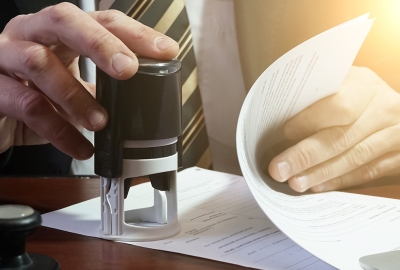Massachusetts Passes Temporary Remote Notarization Law
Update 4/28/20: the below summary, written when this legislation was pending, has been updated to reflect the bill now having been signed into law.
In light of challenges imposed by COVID-19, the Massachusetts legislature passed, and on April 27, 2020 Governor Baker signed into law, Bill S.2645, An Act Providing for Virtual Notarization to Address Challenges Related to COVID-19, which outlines procedures for remote notarization of documents during the declared State of Emergency. The law will remain in place until 3 days after the State of Emergency is lifted.
In order for valid remote notarization to take place, these steps must be followed:
- Both signatory and notary must be physically located in Massachusetts.
- Only an attorney or a paralegal under an attorney?s supervision can remotely notarize mortgages or other documents involving a conveyance of title to real estate, or any will, nomination of guardian or conservator, caregiver authorization affidavit, trust, durable power of attorney, health care proxy or authorization under the federal Health Insurance Portability and Accountability Act of 1996.
- For real estate closings, two video conferences will be required. For documents not related to real estate closings, only one video conference is required. In either case, the process begins with an attorney sending paper documents to the signatory via mail or email for the signatory to print.
- The notary and signatory sign into Zoom or other remote video conference platform. The signatory executes the documents in view of the notary via video conference and shows the notary the front and back of their driver?s license or other acceptable form of photo ID. The notary must follow all other required notarization procedures aside from physical presence, including asking signatory to confirm ?this is your free act and deed.?
- The signatory must also disclose to the notary any other persons physically present in the room with the signatory.
- For real estate transactions where the signatory is not otherwise known by the notary personally, a second form of acceptable photographic identification is required on the initial video conference call as well as front and back copies required to be sent to the notary.
- The signatory mails the documents back to the notary, together with a copy of the front and back of their form of photo identification.
- For real estate closings, upon receipt, the notary and signatory must meet again via video conferencing and the signatory must acknowledge their signature on the document in front of the notary. The notary may then stamp the documents as notarized.
- The notary must sign an affidavit reciting compliance with the specific procedures of the Act. For 10 years, the notary must maintain records including the affidavit, copy of the signatory?s ID and video of the video conference session(s).
- For real estate transactions, if it is later determined that the signatory was not physically present in Massachusetts, or did not accurately disclose the presence or identity of others in the room, it will not constitute grounds to set aside the title to real property acquired by an arm?s length third-party mortgagee or purchaser for value.
Please contact Rich May attorneys Sarah Wegman or Danielle Justo if you require assistance with remote notarization.
Disclaimer: This summary is provided for educational and informational purposes only and is not legal advice. Any specific questions about these topics should be directed to attorney Sarah Wegman.


